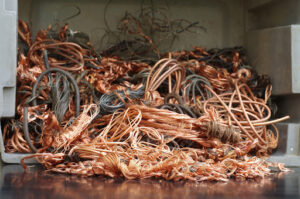If your business generates any scrap copper, you probably noticed that 2021 was a banner year for copper prices. So far, 2022 is following suit. And if your business buys scrap copper, you’ve definitely noticed that copper has been more expensive than ever before.
Globally, copper prices reached all-time highs in 2021 and reached a record high in early March of 2022 – with prices briefly exceeding $5.00 per pound. In May 2021, for example, the price for one metric ton of copper reached $10,512—a 130 percent price increase over March 2020. But the upward price trend isn’t expected to continue indefinitely; the World Bank estimated that the price would decrease to about $7,500 per ton by the end of 2022.
How much you can get for your scrap metal depends on where you live and changes day to day, but here’s one indication of how much the copper market has changed: In late 2020, we told you that scrap copper could bring in more than $2/pound. Over the last year, consumers have seen prices above $3 or even $4 per pound for copper scrap.
Why’s the Price Up for Scrap Copper?
 Copper is always in great demand. It’s widely used in construction because it’s an excellent conductor of heat and electricity, and it’s much more flexible than most metals. Copper can be bent, flattened and formed into whatever shape a manufacturer needs it to be. And like other types of recyclable metals, scrap copper is highly prized because it can be recycled over and over and over again without degrading. It’s also cheaper and more environmentally friendly to use scrap copper compared to mining for virgin copper.
Copper is always in great demand. It’s widely used in construction because it’s an excellent conductor of heat and electricity, and it’s much more flexible than most metals. Copper can be bent, flattened and formed into whatever shape a manufacturer needs it to be. And like other types of recyclable metals, scrap copper is highly prized because it can be recycled over and over and over again without degrading. It’s also cheaper and more environmentally friendly to use scrap copper compared to mining for virgin copper.
So if copper has always been important and valuable, why has the price of copper skyrocketed in recent years? It’s a complex global market, but there are a few key reasons for the surge.
- China has a huge appetite for imported copper scrap. The country imported a record-high 6.68 million tons of copper in 2020, and its demand for copper has helped drive prices up. However, the tide is turning. Copper imports were slightly down in 2021 (though still significant), and it’s expected that China’s demand for copper will continue to gradually decline.
- Supply chain logistics have inflated prices. Like every industry that involves global shipping, scrap copper has been affected by the ongoing shipping crisis and disruptions in the supply chain. It’s taking longer and costing more money to move copper around the world, and that’s reflected in higher copper prices.
- Copper discoveries are down. Analysis from S&P Global shows a downward trend in new copper discoveries over the last decade. In other words, miners aren’t finding as much copper ore as they used to. A slowdown in supply of virgin materials makes existing copper even more valuable. That said: While a slowdown in copper discoveries could be a problem long-term, experts are optimistic about a turnaround. In mid-2021, The International Copper Study Group (ICSG) released predictions that the global copper mine production would rise by 3.5 percent over the course of 2021 and 3.7 percent in 2022.
- Copper stockpiles have been critically low. Largely because of the slowdown in copper mining over the last decade, the existing supply of copper dwindled over the last few years. (The copper inventory held in London Metal Exchange warehouses around the world reached a 16-year low in 2021.) Naturally, as copper supply dried up and demand remained high, copper prices rose. But again, this trend isn’t expected to continue apace because increased mine production should generate more copper supply to meet demand.
Here’s the bottom line for American businesses that generate scrap metal: You don’t want to be sitting on your copper scrap right now. Take advantage of a robust market for scrap copper and convert that coveted metal into cash while prices are high.
Miller Recycling Marks 31 Years as an ISRI Member
Miller Recycling has spent decades tracking scrap metal trends and helping our customers understand their options around scrap metal recycling. Around this time last year, I told you about an exciting milestone for Miller Recycling. We had begun our 30th year as a member of the Institute of Scrap Recycling Industries. A year later, I’m proud to begin Miller Recycling’s 31st year of ISRI membership. Our continuing membership in the scrap metal industry’s top trade association gives us access to resources and networking connections that help us stay at the cutting edge of the scrap recycling industry.
From scrap copper to obsolete electronics and even organic waste, Miller Recycling can help your business manage all its recyclable waste. We can make scrap recycling easy and pay competitive pricing for scrap metal of all kinds. Contact me today to learn more.

